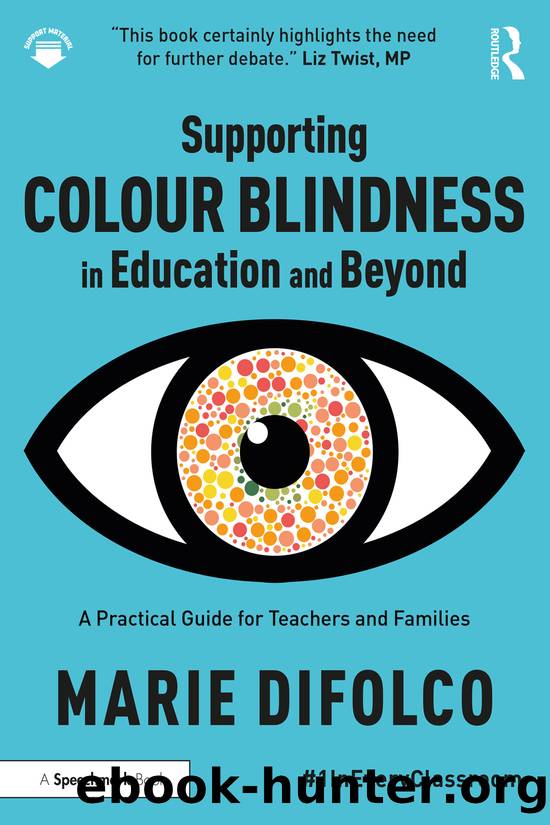Supporting Colour Blindness in Education and Beyond by Marie Difolco

Author:Marie Difolco
Language: eng
Format: epub
ISBN: 9781040186695
Publisher: Routledge
Published: 2024-10-04T00:00:00+00:00
Shattered dreams
I think one of the most distressing things must be to not know youâre Colour Blind until youâre turned away from your dream job, but unfortunately this is the reality for some people when they fail a âmandatoryâ pre-employment colour vision test. A crushing disappointment like this is bound to have negative connotations for mental health.
A feature length documentary Life without Color by filmmaker Robb Jacobson (Jacobson, 2017) is an interesting film and sums up the loss that some Colour Blind people feel when their dreams are shattered.
The 2006 film Little Miss Sunshine (Faris, 2016), though fictional, also depicts what it might feel like to be in this situation. In one particular scene Dwayne learns of his Colour Blindness, then his uncle shatters his ambition when he tells him pilots arenât allowed to have Colour Blindness. Dwayne breaks down, hits the car and walks off crying. Itâs a pretty harrowing watch for the parent of a Colour Blind child and an important reminder that setting expectations early will hopefully avoid such gut wrenching disappointment.
Although most children wonât learn about their Colour Blindness in unfortunate circumstances, entering the workplace for the first time is daunting for anyone, let alone for someone with an unrecognised, non-visible SEND. If the child hasnât been diagnosed, theyâre likely to be leaving school harbouring some insecurities and the things that confused them in the classroom are only going to be magnified when they leave. Even with a diagnosis the child will be wondering if they should hide their condition or reveal it to their new employer. Hiding it could mean they end up in a situation where they make a dangerous, costly or embarrassing mistake. Revealing it might leave them feeling vulnerable, and, if they do decide to speak up about it, when should they do it? Do they reveal it at interview when theyâre likely to be nervous already and risk not getting the job, or do they tell their new employer if theyâre offered the position, who then might be unhappy they didnât raise it previously?
In her article âInvisible Impairments: Dilemmas of Concealment and Disclosureâ (Lingsom, 2008), author Susan Lingsom says, âSocial conventions support silenceâ and that âPeople with invisible impairments have a lot of explaining to do if others are to understand impairment effectsâ. Having a non-visible disability, myself (albeit not Colour Blindness) I relate. In my experience you want to tell people you require reasonable adjustments, but it can be uncomfortable doing so or deciding when to do it. Thereâs always a temptation to want to blend in, to be ânormalâ, but with age and growing confidence I tend to agree with Lingsom when she says by keeping an impairment hidden I âcontribute nothing to dismantling social and structural barriers to participation, belonging and wellbeing of all peopleâ. Society has a duty to help build confidence in people with non-visible disabilities though, so they feel empowered to discuss them without concern for the consequences.
This has to start in school.
Download
This site does not store any files on its server. We only index and link to content provided by other sites. Please contact the content providers to delete copyright contents if any and email us, we'll remove relevant links or contents immediately.
The Art of Coaching Workbook by Elena Aguilar(51199)
Trainspotting by Irvine Welsh(21666)
Twilight of the Idols With the Antichrist and Ecce Homo by Friedrich Nietzsche(18633)
Fangirl by Rainbow Rowell(9251)
Periodization Training for Sports by Tudor Bompa(8273)
Change Your Questions, Change Your Life by Marilee Adams(7783)
This Is How You Lose Her by Junot Diaz(6887)
Asking the Right Questions: A Guide to Critical Thinking by M. Neil Browne & Stuart M. Keeley(5775)
Grit by Angela Duckworth(5615)
Red Sparrow by Jason Matthews(5474)
Paper Towns by Green John(5191)
Room 212 by Kate Stewart(5122)
Ken Follett - World without end by Ken Follett(4733)
Housekeeping by Marilynne Robinson(4447)
The Sports Rules Book by Human Kinetics(4388)
Papillon (English) by Henri Charrière(4274)
Double Down (Diary of a Wimpy Kid Book 11) by Jeff Kinney(4272)
The Motorcycle Diaries by Ernesto Che Guevara(4102)
Exercise Technique Manual for Resistance Training by National Strength & Conditioning Association(4071)
